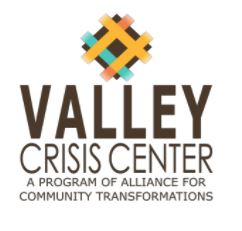CARE Campus Advocate
|
Provides free and confidential assistance for all UC Merced affiliates (including undergraduate students, graduate students, staff and faculty members.) Stop by KL 107. Campus Advocate: 209-386-2051 (text or call) |
 |
National Domestic Violence Hotline
|
Provides essential tools and support to help survivors of domestic violence so they can live their lives free of abuse. (Available 24 hours/ 7 days a week) Call: 1.800.799.7233 Text: 1.800.787.3224 |
 |
Valley Crisis Center
|
Provides free and confidential services to individuals and families who have experienced or are currently experiencing domestic violence or sexual assault. 24-hour hotline: 209-722-HELP (4357) Email: info@alliance4you.org |
 |
UC Merced Counseling and Psychological Services (Students only)
|
Provides free crisis intervention as well as confidential counseling services through individual, couple and group formats for all registered UC Merced students (undergraduate and graduate). 24-hour hotline: 209-228-4266 Call or walk-in to make an appointment. WelltrackCAPS has teamed up with Welltrack to provide Interactive Self-Help Therapy Services! Welltrack provides confidential self-guided tools and resources to help manage stress, anxiety and depression. They have a FREE app on the App Store that can be considered a "Fitbit" for mental health. |
INSIGHT Employee Assistance Program (Staff and Faculty only)
| INSIGHT offers employees and their household dependents three counseling sessions every six months with a licensed professional to assist with work/life concerns. Employees are also entiled to a free 30-minute legal and financial consultation. All services are private and confidential. |
Office of the Ombuds
|
The Office of the Ombuds is designed to serve as a safe alternative channel for confidential, neutral and informal dispute resolution services. Faculty, lecturers, postdoctoral scholars, staff, students and anyone else with a campus-related concern may use the Office of the Ombuds to discuss workplace issues, interpersonal conflicts, academic concerns, bureaucratic slow-downs and other problems. Our services are always voluntary and reports do not constitute a formal notice to the university. |
How to Help a Survivor
- Listen in a sensitive, caring manner and believe them.
- Support them by referring to campus and community resources, like those listed above. Respect their decisions, even if it is different than what you would choose. You can also help them access these resources by helping them find the contact information or accompanying them.
- Protect their Privacy--do not share their story or information without their permission--be transparent about your reporting requirements
- Let them know it's not their fault--no one asks for or deserves this violence.
- Seek consultation support from resources for yourself--Supporting someone can be challenging, especially if you have prior experience with these issues--all of the above resources are available to you as well as a confidential place to process and take care of yourself.
Assure the person that support services are available. Let them know they have options to choose from.
For a Step-by-Step Guide on how to support a survivor, please refer to Supporting Survivors of Sexual Violence: A Step by Step Guide
For More Information about Confidential and Reporting Resources, please refer to CARE Resources and Referral Sheet

